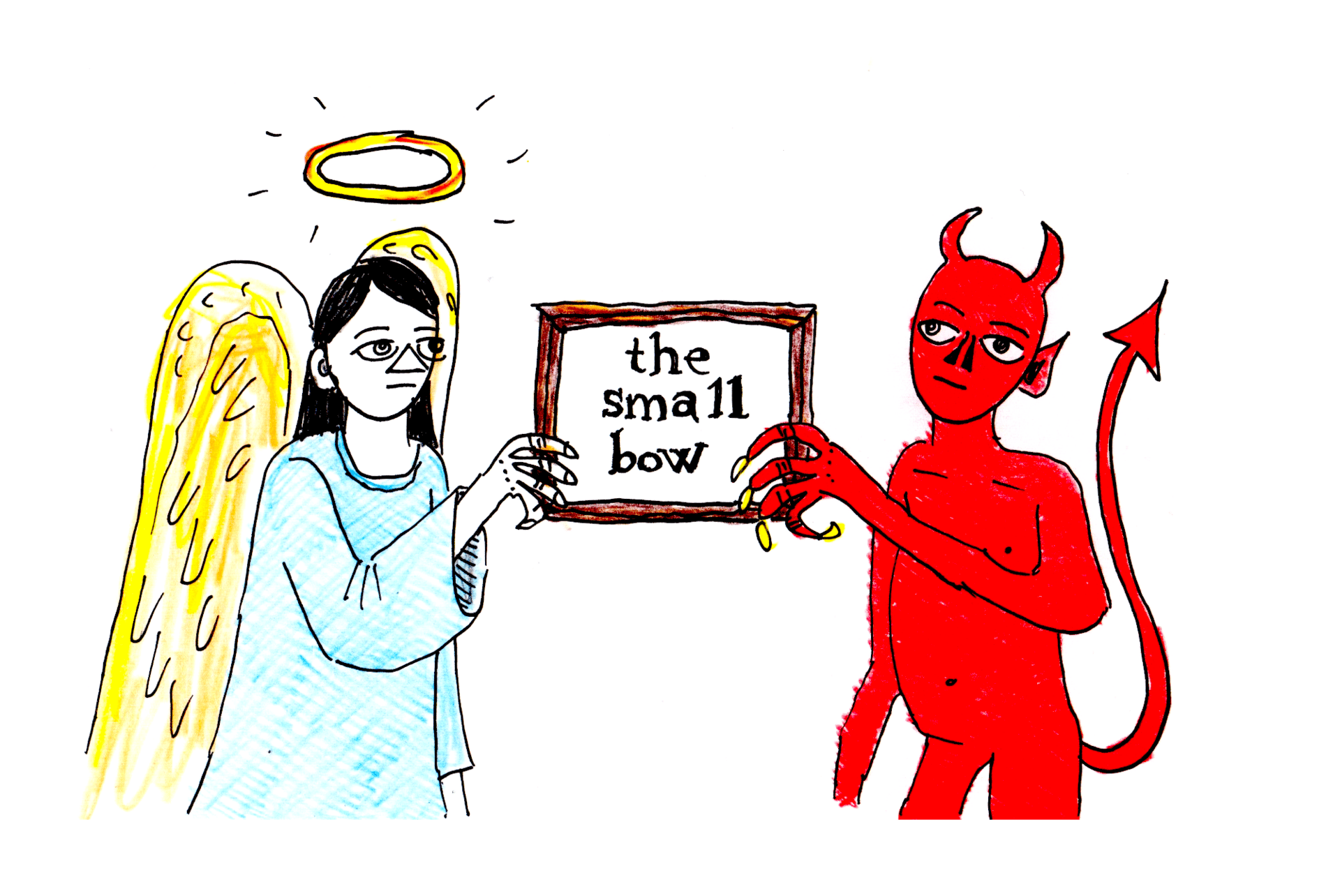
If our newsletter has helped you feel less wicked and alone, less shitty or afraid, then please consider financially supporting us. Subscribers gain access to the entire archive, the Sunday essay, the complete recommendations roundup, and the comprehensive rundown of my weekly recovery program.
If you’d like to become a paid subscriber but can’t afford it at this time, email me: [email protected] and I’ll hook you up.
Clear eyes, full hearts, etc. —AJD
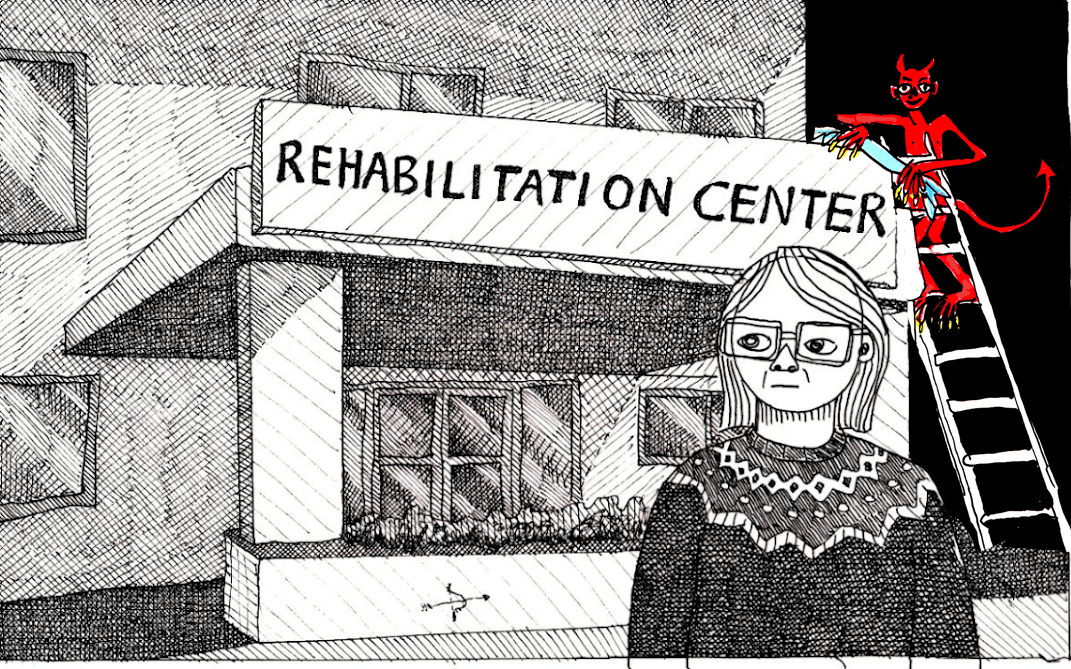
One of the most frustrating opinions some people hold about rehab is that anyone who goes there — either voluntarily or not — has officially blown up and ruined their life once and for all. This is, of course, false — rehab, for the most part, is an earnest attempt by someone to save their own life. This is a triumph. You must believe that about you, or your significant other, or your parent.
Now, rehab isn’t for everyone, either — especially if you don’t have a good insurance plan, the cost is astronomical. But there is also the very real consideration of how many times you should go. In one of his first essays for The Small Bow, Joe Schrank addressed this part of it:
“Rehab can be a great experience. People can learn much about themselves, their current state of affairs, and what to do about it now. The trouble starts when the repetition does. If you’ve been to rehab once, there’s no reason for you to go again. It’s supposed to work the first time around. Yet people get bullied into thinking a new, exotic locale with more personalized care and, oh, more sunshine, horse petting, or something else will lock in sufficient reprogramming. What do multiple visits usually get a patient in terms of net results? Just a collection of rehab mugs.”
He’s right more often than he’s not, but Joe can be cranky sometimes. We wanted to hear about experiences from as many people as possible, so we asked The Small Bow Family Orchestra.
Our submissions raise the question: What’s it like to go to rehab? Good experience or miserable?
As with our other Check-Ins, all the Anonymous writers below are credited collectively as “The Small Bow Family Orchestra.”
The ***** separates individual entries, as do pull quotes.
Edith Zimmerman drew everything.
*****
This Might Just Be the One
by The Small Bow Family Orchestra
*****
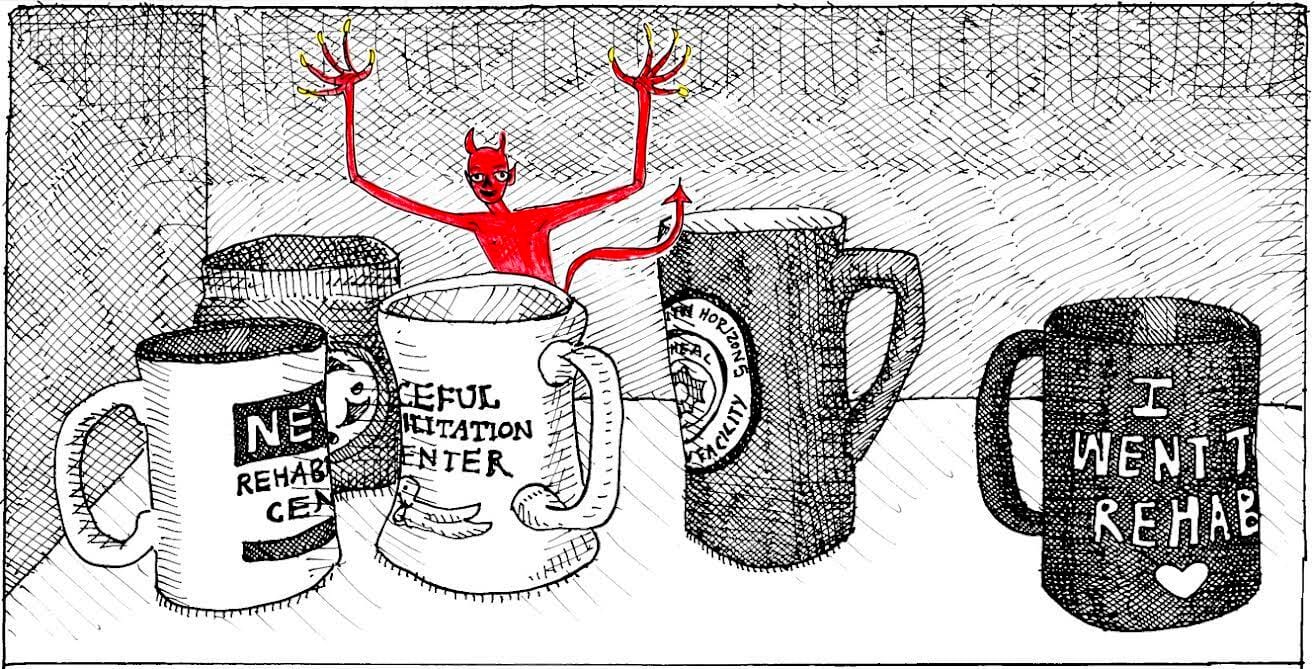
“Please don’t tell my wife I was playing kickball,” I begged my counselor. I was fifteen minutes from my first family session and covered in sweat. My wife hadn’t seen me in ten days while she’d been managing the house, our kid, and her job alone. If she found out I’d spent the morning chasing athletic glory with all the other addicts and alcoholics, I worried our session would start on a sour note. My counselor said she hadn’t planned to mention it, but reminded me that honesty was one of my newfound values. I didn’t yet agree, but somehow kickball never came up as we examined the wreckage of my past.
Because here’s what no one who hasn’t been understands: Rehab is fucking awesome.
I crashed into treatment two days after being fired when I blew a .03 at 2 p.m. on a day I hadn’t been drinking. This was three years after I publicly quit drinking, yet remained drunk almost every hour of those three years. The mental effort sustaining lies, getting caught, faking remorse, and starting over each morning had exhausted me beyond measure. My biggest fear entering treatment was losing access to the dense history books on Audible books I needed to survive restless nights. I hadn’t slept even three hours straight in years.
Eight days later, I closed my eyes at lights out at 10 p.m. and jolted awake in shock at 6 a.m. Good sleep had seemed as impossible as staying sober, yet here I was doing both.
A typical day began with exercise, nutritious breakfast, prayer and meditation, and reading. Then came extensive counseling, group and individual, AA meetings, more therapeutic work, and fun activities like ultimate frisbee, capture the flag, and basketball. I ate well, slept deeply, and at the end of the day gathered around a fire pit with people with whom I felt a deep connection. Outside, my life was either on fire or in ruins, but none of that mattered for that day. I was told “The phone is not your friend” and I embraced the forced vacation. With the right mindset, rehab rivals any five-star resort.
Later in sobriety with a new job and a new kid, as normal life stress piled up, I joked I would have gladly paid for a chance to experience that kind of ease. Thanks to a relapse, I was gifted that opportunity several years later. During my second stay at an extended facility, I noticed the same pattern with nearly every new patient: the first week they actively tried to leave; weeks two and three they complained about everything; and by week four they were begging to stay, not-so-secretly terrified of their addiction and problems waiting outside the gate.
So to anyone considering treatment: embrace the fact that this might be the best vacation you’ll ever take. Plus, it really could save your life.
*****
Here is my rehab story: When my drinking really went off the rails at the end of 2019 and I was a complete mess driving my two small children around every day, I knew I needed an intervention. Someone recommended a 90-day PHP program that would allow me to go home to my kids. They could take me in February 2020.
The pandemic government shutdown started after a few days of treatment.
Rehab was allowed to stay open due to its status as a medical facility, so I drove to the rehab every day like I was Tom Cruise in Vanilla Sky — everything was vastly empty. When I was in Pandemic Rehab there were no expectations of me (such as childcare, PTA duties, food prep, upholding obligations) because everyone was in their own Covid bubble. I was able to focus solely on treatment, not to mention my neglected sense of self. Covid rehab was a miracle for me. I was afraid that people would find out I was in a facility, but with the pandemic, I needn’t have worried. No one noticed my absence, in the best way.
It was also kind of slow at rehab at the height of the pandemic, so groups were small and we got more individual attention. It was a total delight and highly effective for me — I haven’t drank since. But every time I hear an awful Covid story, I feel guilty because Covid saved my life. I don’t think I could have gotten and/or stayed sober without Pandemic Rehab.
*****
It was “all the things.” It was January 30, 1992. After shake-down (empty your pockets) and lock-up, we got roommates. The door slamming and locking behind me was actually a relief. I just didn’t understand that kind of relief at the time.
My roommate was more nuts than me (everyone says that) and he had a variety of “sharps” and explained his methods of using them on unsuspecting sleeping people. I got a new roommate immediately and a full assessment.
Did I need a psychiatrist to question me about why I drank beer by the pitcher and went out with women not my wife? In other words, the assessment pissed me off.
My new roommate had a Bible with recovery information. I could relate. I had to learn how not to be so needy. I had to learn how to ask for help. I had to learn that I was an alcoholic.
The best thing was my physician in there who treated me for the “flu” then sat me down and explained the effects of alcoholism on the body. Finally, someone I could trust! Of the effects, I scored 100. Most of our kind do. Then he shared his experience, strength and hope.
After that I felt at home and relieved that I was disconnected from old playmates and playgrounds. Sounds funny for a 40 year old man with 4 kids. But I got 30 days of freedom and launch into a life of recovery.
After 33 years in small bites (ODAAT) I’m finally finding out I might have experience worth sharing! And I’ve been sober every day since.
*****
I have been to three different rehab facilities, and each was unique in its own way. What they had in common was that they all used the AA 12-Step program.
My first rehab was an in-patient program at a hospital. This 30-day program was for people like me who needed medical supervision while detoxing from street drugs and/or alcohol. We attended AA, CA, and NA meetings nightly.
The second rehab was located in TX, and for 90 days I worked with a therapist and attended experiential therapy focused primarily on emotional responses such as anger management and how it tied into sobriety and relapse prevention.
My third and hopefully last rehab was located outside of Nashville. There were two distinct tracks. One was decidedly Christian, and the other used indigenous methods such as a sweat lodge, equine therapy, medicine wheel, and more. The two groups would come together in the evenings for meetings. This facility also had therapists specifically trained in trauma and eating disorders.
I learned a lot from each of them and while I unfortunately relapsed time and again, I am grateful for all of them — I have not had to change my sobriety date since 2014.
12-Step based rehabilitation is not for everyone. I just know that it worked and keeps working for me. It is what one does when they get out of rehab that makes the difference. As they say in the rooms, go to meetings, get a sponsor, and work the steps.
*****
In July, I went to a 1-week detox at Alpas Wellness in MD. Although I previously had many instances which would serve as rock-bottom for most people, this was mine. I went voluntarily, but it was a surrender. I needed meds to get off the physical addiction. But what happened there went beyond physical healing. I asked God to take over, and He did. The compulsion was lifted.
I was blessed to be in a place professionally and personally that allowed me to go off the grid for a week and heal. The people there — the staff and the other patients — were amazing. While I hope to never do it again, I would recommend it to anyone who is considering it. But you have to be ready to surrender, listen, and take the action. One day at a time.
*****
What’s it like to go to rehab? The word contemptible comes to mind. A place full of losers who lacked the willpower or discipline to fix their lives. At least, that was what I thought.
As they say in AA, you don’t show up in the rooms when you’re on a winning streak. The same goes for rehab. I wound up there after exhausting every possible way to fix my career, marriage, friendships, and increasingly, my parenting. Even my therapist, who had been working with me for a year, finally said there was nothing more she could do until I got help for my drinking. “Geez,” I thought, “isn’t that why I am here?” Still, she kindly answered all of my anxious questions about what rehab might be like.
At Hazelden Betty Ford, my intake evaluation was humbling. The clinician asked about my mental health, my history with alcohol, and my family. I went alone, praying I would not see anyone I knew. It never occurred to me that if I did, they might be there for the same reason. The diagnosis was borderline inpatient. My drinking was severe enough that isolation might help, but an intensive outpatient program, four hours a day, five days a week, could also be enough.
The idea of rehab seemed strange. I understood physical therapy: You rebuild strength through repetition. But how does that apply to not drinking? I had read countless self-help books, searching for the magic words that would break alcohol’s enchantment. I had quit smoking cold turkey after reading The Easy Way to Stop Smoking. Why could I not do the same here?
Because I had already tried everything else, I decided to stop fighting and follow directions. They say addiction thrives in secrecy, and that it is a family disease. When I told my wife I was going to rehab, she asked, “For what?” Maybe she truly did not know, or maybe denial was easier.
Rehab is rough, at least at first. My outpatient group rotated weekly, with graduates leaving as newcomers arrived. The last time I had been in a room like that was after a DUI at twenty-one. Back then I thought, I don’t belong here with these losers. At Hazelden, I saw that younger version of myself in the faces of others.
The first time I spoke, I could barely say my name. When asked why I drank, I said it helped me sleep. We literally had a brain surgeon in our group, on his third time through rehab. There was an attorney, a pilot, stay-at-home parents, and an eighteen-year-old cokehead. My story, I realized, was not special.
Each day our counselor taught lessons on the roots of addiction and tools for self-regulation. The real work came from people sharing their “experience, strength, and hope.” I listened to stories of divorce, self-harm, relapse, and grief, and slowly began to share my own. The more I opened up, the lighter I felt.
I am now one month away from seven years sober. Rehab did not erase life’s pain, but it gave me a community, a language for honesty, and faith that I will be ok. For a place I once thought contemptible, it turned out to be where I began to heal.
*****
I went to rehab on a drunken whim, hungover from a rare night of social drinking and drinking again to quell said hangover and contemplating killing myself. I was on the phone with my sister and blacked out during the call, fell asleep and woke up to a text saying, “You’re so mean when you’re drinking.”
She’s a therapist and suggested I needed to go to rehab. So I googled “rehab Florida,” and essentially clicked the first link, sent a $3k deposit (I was uninsured), and swore I’d be there two days later. The next day was a blur of bringing my dog to my aunt’s an hour away, packing, and calling or texting friends to let them know I’d be out of communication for a month. I had to borrow money because mine was wrapped up in investments, but I did it all and I showed up.
Rehab was not what I expected. I would dare to say I had fun, but I had no responsibilities, no job or kids that missed me, and did not look at my phone for the entire month, which all were stressors for others. I had no legal ramifications to go back to. Group therapy was helpful and not too hard, I was not honest about how bad my drinking had gotten and I people-pleased the whole way through. I was out to prove I was the least bad alcoholic in the place.
During my time there I really got to see that rehab is a business, and it’s a good one. Case managers push you to additional forms of treatment, sometimes without your consent and just based on whatever your insurance will pay for. Drugs were thrown over a short wall and two people overdosed, one being revived by a fellow patient because the staff couldn’t find narcan fast enough and wasn’t trained in CPR. I was drugged while I was there because a friend and I got too involved in finding out who was dealing.
Am I glad I went? Yes. I am now in a 12-step program that has completely transformed my life and I would never have made it there had I not seen the havoc that drugs and alcohol addiction can bring to your life so first hand. I had done sobriety alone in the past and I’m frankly lucky I didn’t take my own life during those miserable times. Rehab to me was a crash course into the world of recovery and I needed a drunken $3k deposit to get me there, so for that I’m grateful.
*****
I checked into Mountainside Treatment Center on March 26, 2024 and I feel so cheesy saying this, but I had a great experience. I specifically chose Mountainside because it was focused on wellness as a whole, and not specifically a 12-step program. This was my first time going to rehab (but not my first time trying to quit drinking) so I didn’t really know what to expect.
I did seven days in detox and half way through, I wondered why I still needed to be in detox, having only suffered through one night of night sweats and increased blood pressure. But then I decided to treat it like a vacation, and just relaxed.
I fully credit members of the wellness team and my clinician with helping me realize that I needed to be there. I still had moments where I thought I wasn’t really an alcoholic, and things were worse for other people. And while that might be true, that didn’t mean I didn’t need to be here. My clinician had my number from the beginning. From the first time we sat down, she said to me, it sounds like you take care of everyone else, but when do you take care of yourself? This was a 5-week opportunity to take care of myself, and so that’s what I tried to do.
At some point, I decided that I was going to throw myself into what was being offered to me because for me, this was a one and done situation. I was scared of so many things. Taking yoga, walking up the mountain, being vulnerable, sounding stupid, etc.
It was almost the end of my time there, and I was trying to mediate, but all I could think about was whether or not I should take the opportunity to go camping before I left. I was TERRIFIED, but at the same time, I knew that I wanted to put all my cards on the table while I was here. I wanted to leave Mountainside knowing that I had done everything possible to be successful once I left. So I went camping. And oh my god was it hard. When we did a hike on the second day, I struggled. But everyone was patient, and kind, and encouraging. And when I got to the top I just sobbed because I couldn’t understand why everyone, even strangers, believed in me and I couldn’t believe in myself. And that was the major lesson I took away. I can do hard things, and sometimes I need to ask for help and that’s not a sign of weakness.
To sum it up, I found the right rehab for me, and did the work, and ended up getting a lot out of it. I know I am one of the lucky ones in that I am now 19 months sober, and feel like I’m going strong.
*****
I currently live with 20 other men.
At 52, I never imagined having to explain a roommate, let alone 24 of them — half of whom are straight out of prison. This is my fifth alcohol addiction treatment centre in 20 years. These liminal, lucid places of recovery reset my psyche and sobriety — but damn, if I have to do this again.
Each time, I genuinely think, this just might be the one. But despite good stretches of sobriety and big wins in love, family and jobs, relapse is part of my story.
The first week is the toughest. I’m discharged from detox with a duffle bag, shown to my space and meet a leery new roommate. On a corkboard above my single bed, I pin up my photos of loved ones — creased photos with pin holes from the last place. I sign papers, read the rules and feel the unbearable weight of shame and jarring displacement.
But the next weeks feel more promising. The model of a fresh program always excites me, and I write a long email to my loved ones, full of anecdotes, assurance and hope.
“This just might be the one.”
I’ve been in a high-end facility with university-level lectures, ornate fountains and five-star food. I’ve been in a publicly funded house that sat next door to a biker house and slept us six to a room. I’ve shared spaces with surgeons and I’ve shared rooms with jailbirds (both of whom know how to fix a broken nose, just in different ways).
I’ve experienced transformative tears in sharing circles and seen redemption light up a room. Then again, I’ve seen board game brawls and charades shut down for shoving. Contemplative mornings have led to deep connections with peers. On the other hand, I’ve been called emasculating names for wearing colourful socks.
I always strive to be the star student with my collared shirts and stacks of Moleskine journals. Yet without fail, the most exasperating, disruptive bro of the bunch — the gym rat who thanks protein shakes in the gratitude circle — has been sober way longer than me.
Dichotomies like this help erode my ego and expectations, which is the very core of transformation. I cannot think my way out of this disease.
I write this during my second month in this treatment centre. Right now, my honey is in Hawaii, my best friend is beginning a book tour, and countless friends share their successes online.
I have to shut that shit out. Outside, life is running like horses over the horizon, and I am here to heal in this stationary society of beautiful madmen.
Today was hard. Two guys were kicked out when, off their restrictions, they scored and pissed positive. We moved forward. We held them in our hearts. We did our chores. And we nodded to one another in the hallways, as if to say, this just might be the one.
*****
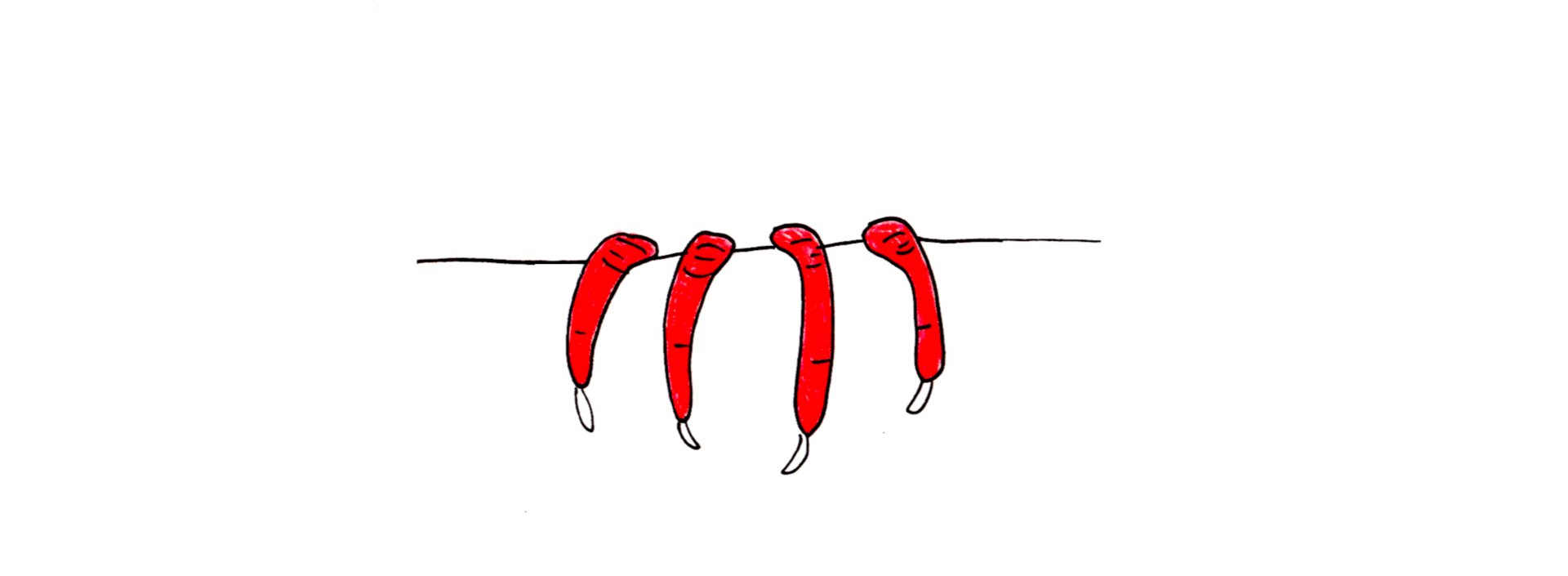
MORE REHAB:
*****
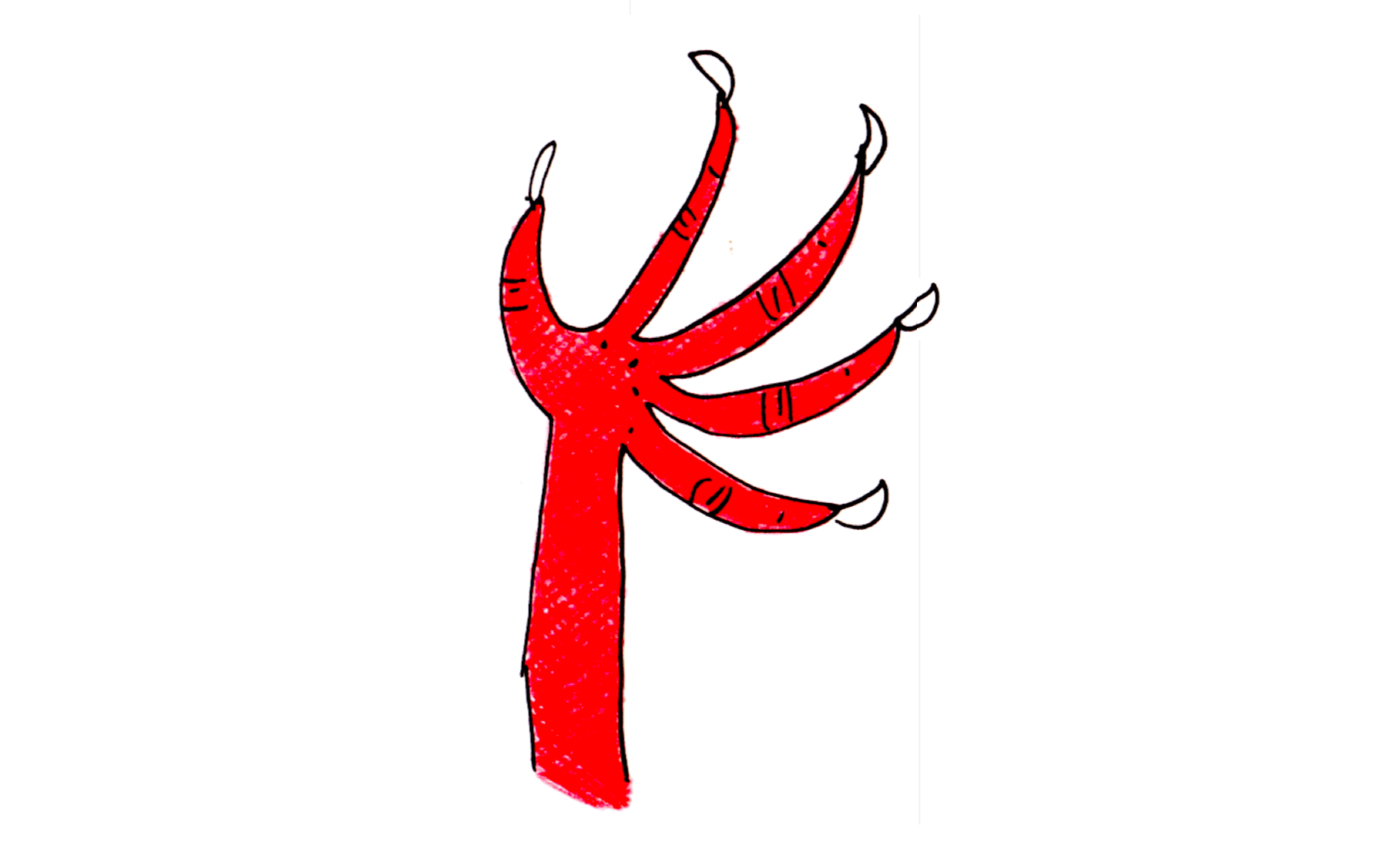
All Illustrations by Edith Zimmerman
Thanks for reading! This post is public so feel free to share it.
